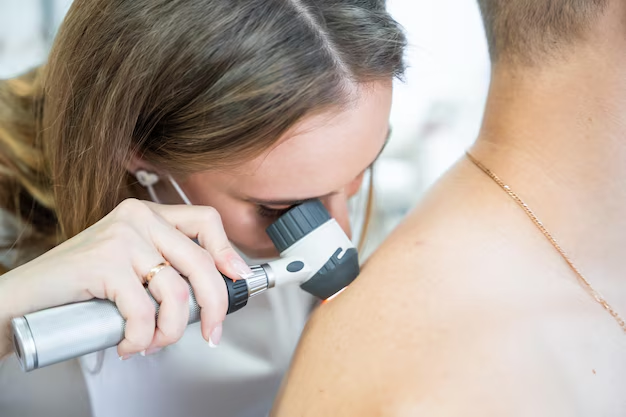Understanding Skin Cancer: Can It Be Treated Successfully?
Skin cancer, a condition feared by many, often raises the question: Is skin cancer treatable? The answer is a resounding yes, but the effectiveness and approach of treatment can depend on several factors. Let's explore the treatment landscape of skin cancer, addressing crucial subtopics to offer a well-rounded perspective on the road to recovery.
What Is Skin Cancer?
Skin cancer develops when skin cells grow uncontrollably. It's the most common type of cancer, categorized primarily into three types: basal cell carcinoma, squamous cell carcinoma, and melanoma. Each type varies in severity and prognosis, influencing how they are treated.
Types of Skin Cancer
Basal Cell Carcinoma (BCC): The most common and least aggressive, usually characterized by red patches or a shiny bump. It often occurs in sun-exposed areas.
Squamous Cell Carcinoma (SCC): Generally more aggressive than BCC, this type can look like a scaly red patch or open sore.
Melanoma: The most serious form. Melanoma can quickly spread to other parts of the body, making early detection vital.
Factors Influencing Treatment Success
The treatability of skin cancer is influenced by several key factors:
- Stage of Cancer: Early detection often allows for easier and more effective treatment.
- Location and Size: Cancers in challenging areas might require more intense treatment.
- Patient’s Health: Overall health can affect treatment options and recovery.
- Type of Cancer: Melanoma, for instance, may require different strategies than BCC or SCC.
Treatment Options for Skin Cancer
1. Surgical Treatments
Surgery remains the most common treatment for skin cancer.
Mohs Surgery
Mohs surgery is a meticulous procedure frequently used for BCC and SCC. It involves removing the cancerous tissue layer by layer, ensuring minimal harm to surrounding healthy tissue. This technique offers a high success rate, especially in complex cases or for cancers located in sensitive areas.
Excisional Surgery
This involves cutting out the cancerous tissue along with some surrounding healthy tissue to ensure clear margins. It's often used for melanoma and larger BCC or SCC.
2. Non-Surgical Treatments
In some cases, surgery may not be the best option, leading to alternative treatments:
Radiation Therapy
Radiation may be suitable for cancers that are hard to treat with surgery or those who cannot undergo surgical procedures. It's a non-invasive approach that targets and destroys cancer cells.
Cryotherapy
Involves freezing the cancer cells, often used for pre-cancerous conditions or small lesions.
Topical Treatments
Topical medications like imiquimod cream and 5-fluorouracil can treat certain types of superficial skin cancers by boosting the immune system to fight cancer cells.
Photodynamic Therapy (PDT)
PDT leverages a photosensitizing agent and light to destroy cancer cells, effective in treating early stages of BCC and SCC.
3. Systemic Treatments
When cancer spreads, systemic treatments might be necessary.
Chemotherapy
Though less common for skin cancer, chemotherapy can be used if the cancer has spread beyond the skin. Topical chemotherapy might be used for surface-level cancers.
Targeted Therapy and Immunotherapy
Targeted therapies focus on specific aspects of cancer cells that help them grow, while immunotherapy leverages the body’s immune system to fight cancer. These are often used for advanced melanoma, showing promising results in recent years.
Preventing Skin Cancer Recurrence
Once treatment is complete, efforts shift towards preventing recurrence and maintaining health.
Sun Protection
Adequate sun protection is critical. Regular use of broad-spectrum sunscreen, wearing protective clothing, and avoiding peak sun hours play a vital role in prevention.
Regular Skin Checks
Frequent self-examinations and professional skin checks ensure any new changes are caught early. Early detection remains a patient's best prognosis.
Lifestyle Choices
A healthy lifestyle, including a balanced diet and regular exercise, can bolster the immune system and support recovery.
Innovative Research and Future Directions
Advancements in medical research continue to open new avenues for skin cancer treatment.
Genetic Research
Research into genetic factors holds promise for personalized treatment regimens. Understanding a patient's genetic makeup can tailor therapies to be more effective.
Vaccine Development
Emerging research is exploring vaccines that might prevent melanoma or reduce recurrence, marking an exciting frontier in skin cancer treatment.
Empowering Patients with Knowledge
While skin cancer is indeed treatable, education is vital for ensuring positive outcomes. Patients are encouraged to:
- Seek Regular Medical Advice: Continuous consultation with healthcare professionals ensures timely and effective treatment responses.
- Stay Informed: Awareness about new research and treatment options can empower individuals to advocate for the best care.
- Adopt Preventative Measures: Beyond treatment, preventive actions are crucial for reducing the risk of skin cancer altogether.
In closing, understanding the dynamics of skin cancer treatment transforms what can be an intimidating diagnosis into a manageable condition. By unpacking the types, influences, and treatments of skin cancer, we can approach this challenge with informed, empowered, and proactive strategies.
Quick Summary: 🌞
- Skin Cancer Types: Includes BCC, SCC, and melanoma, each with different treatment paths.
- Treatment Approaches: Surgery (Mohs, excisional), radiation, topicals, PDT, chemotherapy, targeted therapy, and immunotherapy.
- Prevention Tips: Use sunscreen, perform regular skin checks, and invest in healthy lifestyle choices.
- Research & Innovations: Genetic insights and vaccine development promise future breakthroughs.
- Patient Empowerment: Stay informed and seek regular medical guidance for better outcomes.

Related Articles
- Are Breast Cancer Lumps Painful
- Are Chills a Sign Of Cancer
- Are Colon Spasms a Sign Of Cancer
- Are Lytic Lesions Always Cancer
- Are Polyps Cancer
- Can a Blood Test Detect Cancer
- Can a Ct Scan Detect Cancer
- Can a Dexa Scan Show Cancer
- Can a Gastric Emptying Scan Show Cancer
- Can a Lung Biopsy Cause Cancer To Spread
